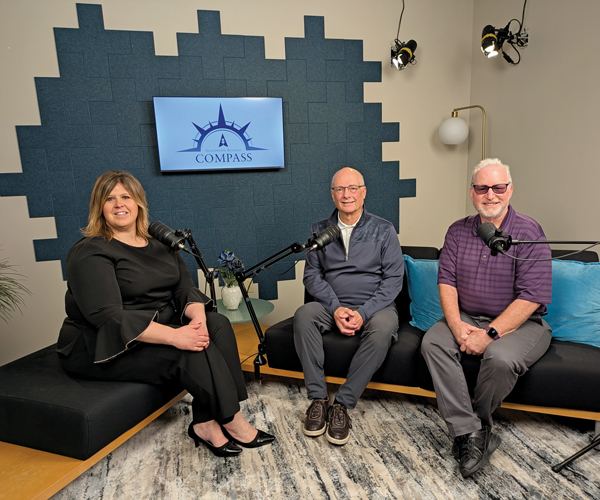1. Beth Mooney: Chairman and CEO, KeyCorp
Beth Mooney has always had a hard time using the word “no.”
In fact, Mooney’s 37-year banking career — and the civic and community leadership that has come along with it — has been firmly built on a foundation of “yes.”
Yes to each promotion that took this rising star through nine job moves in 16 years. Yes to meaningful civic leadership in each of the cities where she’s lived. Yes to the job offer from KeyCorp that brought her to Cleveland — the place she now says she was always meant to be. And yes to the influential civic commitments she’s taken on since her arrival here, including board chair of the Greater Cleveland Partnership, co-chair of the Republican National Convention Host Committee and board member of the Cleveland Clinic.
“Whenever life gives you opportunities, whenever life puts you in a position of leadership, you have an obligation to take that very seriously, to commit to give it your all for the benefit of others,” says Mooney, 60. “That’s part of the core of servant leadership which is something I really believe in.”
This year marks 10 years since Mooney arrived in Northeast Ohio to lead Key Community Bank, recruited by longtime Key CEO Henry L. Meyer III away from her then-post as CFO of AmSouth Bancorporation in Alabama. When she assumed the spot of chairman and CEO from the retiring Meyer in 2011, she became the first woman to lead one of the nation’s top 20 banks and one of only 20 women (now 21) at the head of a Fortune 500 company.
In addition to topping Community Leader’s Power 100 list this year, she also made Fortune’s 2015 list of the 50 Most Powerful Women in Business, and American Banker recently named her the Most Powerful Woman in Banking and Finance for the third consecutive year.
As a relative newcomer to Northeast Ohio, Mooney’s rise into civic leadership has been swift. She credits other civic leaders here for giving her such opportunities to serve.
“In other communities I have lived in … you have to earn your way to the table, … being on the outside until someone says, ‘You’ve been here long enough that we are willing to let you to the table,’ ” she says. “This is a community where people say, if you want to be part of this community, if you want to bring your skills and leadership, we want you to be part of it.”
One cause nearest and dearest to her heart is music, and Mooney has volunteered for symphony orchestras in every city where she’s lived. So when Gary Hanson, then executive director of the Cleveland Orchestra, heard from colleagues at the Nashville Symphony that Beth was on her way to Cleveland in 2006, Hanson’s board’s president approached her right away to secure her board spot, a position she still holds today.
“She’s the definition of someone who uses common sense. … There’s no artifice to her approach to solving problems and leadership,” says Hanson. “When she is involved in something, she is all in.”
The same goes for Mooney’s involvement in the Greater Cleveland Partnership, where she assumed the board chairmanship in 2014. Under her leadership, the organization has tackled an aggressive and wide-reaching agenda that has included support of education reform, workforce development, diversity initiatives and even police reform.
“For a relatively short period of time being here, I’ve been impressed by the depth of knowledge she has about our region,” says Joe Roman, president and CEO of the Greater Cleveland Partnership. “That can only come through incredible listening skills.”
When Mooney chose to get behind the 2014 effort to secure the 2016 Republican National Convention, she went far beyond simply allocating Key’s financial resources.
“It wasn’t just an issue of throwing Key’s support behind it, it was about civic leadership,” says Sandy Cutler, another co-chair of the RNC Host Committee and soon-to-retire CEO of Eaton Corp. “[The RNC Selection Committee] came away from their visit seeing that this is a highly engaged community. They had the support and commitment of senior leaders [like Mooney].”
Mooney has earned a reputation as a leader who puts passion and action behind the boards she signs onto — which have also included involvement in Neighborhood Progress and United Way — despite a packed schedule of civic commitments, bank management and leadership roles in the banking industry.
“The bank is first, second and third priority. This is my life’s work. Twenty to 30 percent [of my time] I balance between other things, but it all adds up to north of 100 percent,” she says. “You do what you need to do to get things done.”
During her tenure, Key navigated the financial crisis and has emerged strong and healthy. With its October announcement of the $4.1 billion acquisition of FirstNiagara, Key is on its way to becoming the 13th largest U.S. bank with more than $135 billion in assets. Key’s stock price is holding steady around $13 per share — after hitting a low of $7 during the financial crisis — and has increased its local market share with more than 100 branches.
“She is not only well-respected, but also well-liked,” says Bonnie McGeer, executive editor of American Banker and chair of the magazine’s Most Powerful Women in Banking and Finance program. “One of the questions we asked our honorees … this year was, ‘What woman in the rankings past or present would you most like to have dinner with?’ Beth was the most common answer given. I think that says a lot about what her peers in the industry think of her.”
Mooney says she never expected the notoriety that came along with becoming the first female CEO of a top 20 U.S. bank.
“I was totally taken aback. I didn’t see it coming,” she says. “It comes with a huge sense of obligation. It’s like having a torch handed to you. What do you do with a torch? You use it to light the way for others.”
Mooney describes that obligation not as a burden but as an opportunity to demonstrate strong leadership to Key’s shareholders, customers, employees and the community. She subscribes to the many sayings that link power with responsibility, such as this Bible verse: “From everyone who has been given much, much will be demanded; and from the one who has been entrusted with much, much more will be asked.”
In particular, she believes she’s lighting the way for other women on the rise.
“There is an extra sense of obligation to do it well so it is easier for the next one. If I didn’t do it well, it would be, ‘Remember that time so-and-so did it, and see how that worked out,’ ” she says. “It would become folklore. I don’t want to be on the rubbish heap of folklore.”
Despite being singled out as a powerful person — here and nationally — Mooney feels uncomfortable with the word “power.” A student of history — she got her undergraduate degree in the subject from the University of Texas in 1977 — she sees too many figures over the centuries who have sought and used power in destructive ways. She much prefers to think about her power as “influence.”
“My passion is genuine. My commitment is real. It is my privilege [to serve],” Mooney says. “These are the kinds of people who come to the table in Cleveland and whom the community embraces.” We start our search for the region’s most powerful leaders by turning to those who know power best. Beginning with the individuals ranked most powerful by Inside Business magazine in 2015, we ask them who wields the most influence in Northeast Ohio today, who we should be watching, and who is most poised to make a difference in communities in Akron-Canton, Cuyahoga, Geauga, Lake and Lorain counties and the Mahoning Valley in 2016. Then we combined their feedback with our news judgment about the events and happenings affecting our region, weighing heavily philanthropic and civic commitments to determine the top 100 executives, politicians and players we’re proud to name Northeast Ohio’s more powerful community leaders.




